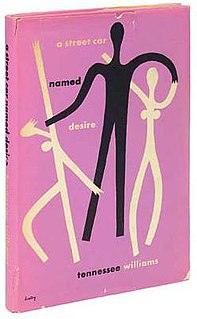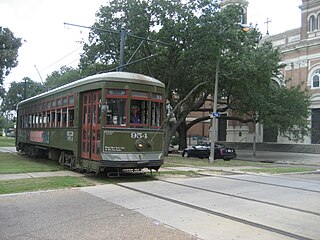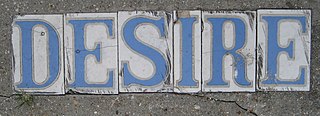
A Streetcar Named Desire is a 1947 play written by American playwright Tennessee Williams that received the Pulitzer Prize for Drama in 1948. The play opened on Broadway on December 3, 1947, and closed on December 17, 1949, in the Ethel Barrymore Theatre. The Broadway production was directed by Elia Kazan and starred Jessica Tandy, Marlon Brando, Karl Malden, and Kim Hunter. The London production opened in 1949 with Bonar Colleano, Vivien Leigh, Renee Asherson and Bernard Braden and was directed by Laurence Olivier. The drama A Streetcar Named Desire is often regarded as among the finest plays of the 20th century, and is considered by many to be Williams' greatest work.
A streetcar or tram is a vehicle that travels on rails, typically in a street.

Stanley Kowalski is a fictional character in Tennessee Williams' play A Streetcar Named Desire.

Perley A. Thomas Car Works, Inc. was a 20th-century builder of wooden and steel streetcars, based in High Point, North Carolina in the United States. It was named for its founder, Perley A. Thomas. Thomas had been employed by Southern Car Works in High Point, then formed his own company when Southern went out of business.
"A Streetcar Named Marge" is the second episode of The Simpsons' fourth season. It first aired on the Fox network in the United States on October 1, 1992. In the episode, Marge wins the role of Blanche DuBois in a community theatre musical version of Tennessee Williams' A Streetcar Named Desire. Homer offers little support for his wife's acting pursuits, and Marge begins to see parallels between him and Stanley Kowalski, the play's boorish lead male character. The episode contains a subplot in which Maggie Simpson attempts to retrieve her pacifier from a strict daycare owner.
Nick Dennis was a Greek American film actor born in Thessaly, Greece. The supporting actor, who began in films in 1947, was known for playing ethnic types in films such as Kiss Me Deadly and the Humphrey Bogart film Sirocco. Dennis, who spoke Greek fluently, appeared in a number of television programs in the 1960s and 1970s including playing the parts of Orderly Nick Kanavaras on the medical drama Ben Casey and Uncle Constantine on the detective show Kojak.

A Streetcar Named Desire is a 1951 American drama film, adapted from Tennessee Williams's Pulitzer Prize-winning 1947 play of the same name. It tells the story of a southern belle, Blanche DuBois, who, after encountering a series of personal losses, leaves her aristocratic background seeking refuge with her sister and brother-in-law in a dilapidated New Orleans tenement. The Broadway production and cast was converted to film with several changes.

A Streetcar Named Desire is an opera composed by André Previn with a libretto by Philip Littell in 1995. It is based on the play by Tennessee Williams.
A Streetcar Named Desire may refer to:

Desire Street is a street in New Orleans, Louisiana, in the United States. According to John Churchill Chase, the street is named for Désirée Gautier Montrieul, the daughter of Robert Gautier de Montrieul who owned the plantation on the land where the street now lies. She married François de La Barre, for whom Labarre Road in Metairie is named. Her sister, Elmire de Montrieul, also had a street named after which was itself anglicized as Elmire Street, however it was renamed to Gallier Street circa 1895. Jed Horne, author of the 2005 book Desire Street, suggests that name is a misspelled homage to Désirée Clary a fiancé of Napoleon. The play A Streetcar Named Desire, by Tennessee Williams, refers to the former streetcar line to this street.

A Streetcar Named Desire is a 1995 made-for-television drama film directed by Glenn Jordan and starring Alec Baldwin, Jessica Lange, John Goodman and Diane Lane that first aired on CBS Television. Based on the 1947 play by Tennessee Williams, it follows a 1951 adaptation starring Marlon Brando and a 1984 television adaptation. The film was adapted from a 1992 Broadway revival of the play, also starring Baldwin and Lange.

A Streetcar Named Desire is a 1984 American made-for-television drama film directed by John Erman and based on the 1947 play of the same name by Tennessee Williams. The film stars Ann-Margret and Treat Williams and premiered on ABC on March 4, 1984.

The Seven Descents of Myrtle is a play by Tennessee Williams. It originally began as a short story, which Williams then turned into a one-act play, and then later revised it into the seven-act play that is accepted today. Its title character is reminiscent of another Williams' heroine, Blanche Dubois in A Streetcar Named Desire.

Valerie Elizabeth Bettis was an American modern dancer and choreographer. She found success in musical theatre, ballet, and as a solo dancer.
Oscar Saul was an American writer. Saul wrote or collaborated on the screenplays for numerous movies from the 1940s through to the early 1980s. His best-known work was on the screen adaptation of Tennessee Williams' A Streetcar Named Desire.
A memory play is a play in which a lead character narrates the events of the play, which are drawn from the character's memory. The term was coined by playwright Tennessee Williams, describing his work The Glass Menagerie. In his production notes, Williams says, "Being a 'memory play', The Glass Menagerie can be presented with unusual freedom of convention." In a widening of the definition, it has been argued that Harold Pinter's plays Old Times, No Man's Land and Betrayal are memory plays, where "memory becomes a weapon". Brian Friel's Dancing at Lughnasa is a late 20th-century example of the genre.
Maria Britneva, later Lady Maria St. Just was a Russian-British actress who was a friend of Tennessee Williams and his literary executor.
The Magic Tower and Other One-Act Plays is a collection of 15 plays, seven of them previously unpublished, by American playwright Tennessee Williams. Published by New Directions in New York City in 2011, Williams' scholar Thomas Keith edited the volume and provided the critical notes while playwright Terrence McNally, winner of four Tony Awards, wrote the foreword.

The City of New York, usually called either New York City (NYC) or simply New York (NY), is the most populous city in the United States and thus also in the state of New York. With an estimated 2017 population of 8,622,698 distributed over a land area of about 302.6 square miles (784 km2), New York is also the most densely populated major city in the United States. Located at the southern tip of the state of New York, the city is the center of the New York metropolitan area, the largest metropolitan area in the world by urban landmass and one of the world's most populous megacities, with an estimated 20,320,876 people in its 2017 Metropolitan Statistical Area and 23,876,155 residents in its Combined Statistical Area. A global power city, New York City has been described as the cultural, financial, and media capital of the world, and exerts a significant impact upon commerce, entertainment, research, technology, education, politics, tourism, art, fashion, and sports. The city's fast pace has inspired the term New York minute. Home to the headquarters of the United Nations, New York is an important center for international diplomacy.

The International Standard Book Number (ISBN) is a numeric commercial book identifier which is intended to be unique. Publishers purchase ISBNs from an affiliate of the International ISBN Agency.















